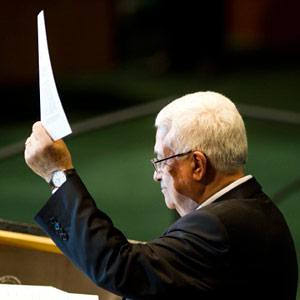
Palestinian President Mahmoud Abbas waving a copy of the letter delivered to the UN Security Council calling for state recognition for the people of this occupied nation in the Middle East. Abbas addressed the General Assembly on September 23, 2011., a photo by Pan-African News Wire File Photos on Flickr.
UN Security Council starts talks on Palestinian bid
UNITED NATIONS, UNITED STATES
Sep 26 2011 18:08
The United Nations Security Council on Monday embarked on tortuous negotiations on the Palestinian bid for UN membership as major powers stepped up pressure for new Palestinian-Israeli talks.
There was little sign, however, that the two foes are ready to resume negotiations frozen for the past year, despite their proclamations since Palestinian president Mahmoud Abbas made his historic application to the United Nations on Friday.
The UN Security Council was due to start its first formal talk on the Palestinian bid for state recognition on Monday at 7pm GMT (9pm South African time). The United States has vowed to veto any resolution in favour of the Palestinians, but no vote is expected for several weeks.
Ahead of the meeting, experts from the 15 council nations started contacts on how the bid will be dealt with, diplomats said. The council must refer the application to a special committee, which will make a recommendation.
US Secretary of State Hillary Clinton held talks with Lebanon's Prime Minister Nijab Mikati at the Security Council chamber before the meeting. Lebanon holds the council presidency in September and has backed the Palestinian bid.
US President Barack Obama told Abbas publicly and privately last week that there could be no Palestinian state without an accord with the Israelis reached through direct talks.
Four's a crowd
The diplomatic Quartet on the Middle East -- the United States, Russia, the European Union and the United Nations -- has launched a new bid to resume talks with a set timetable for an accord.
But Abbas, riding a wave of popular support in the occupied territories, says he is ready for talks but first there must be a "complete halt" to Israeli settlement building in the occupied territories.
Israel's Prime Minister Benjamin Netanyahu has said he wants talks without conditions and is refusing to halt the new settlements.
A senior UN official, speaking on condition of anonymity, said on the sidelines of the Clinton-Mikati talks that he saw "little hope" for new direct talks.
The Quartet has called for talks to start within a month, proposals from both sides in three months, major progress in six months and a final deal by the end of 2012.
The Quartet's special envoy, former British prime minister Tony Blair, has said his campaign to get the two sides back together will be a test of their "sincerity".
Back to the bid
For the vote to pass, the Palestinians need the support of nine out of the 15 members of the Security Council.
The United States is hoping that at least six members will oppose the bid or abstain so that it is not forced into a veto that could harm its image in the Middle East. The mathematics is not yet clear, but diplomats say the Palestinians will struggle to get nine votes.
On Sunday, Abbas was hailed as a conquering hero when he returned to his West Bank headquarters in Ramallah.
The Palestinians, who pulled out of the last direct talks one year ago after a settlement moratorium was lifted, argue that Israel has already annexed Jerusalem and has been stealing land for the past 20 years.
"We've been negotiating ad nauseum with a process that had no relationship to reality. That's the problem," senior Palestinian negotiator Hanan Ashrawi told US broadcaster ABC on Sunday.
Israeli Prime Minister Benjamin Netanyahu said his advice for Abbas was: "If you want to get to peace, put all your preconditions to the side."
Since it occupied the West Bank in 1967, Israel has built more than 130 settlements there, home to more than 300 000 people. Another 200 000 Israelis live in settlement neighborhoods in east Jerusalem.
Israel considers both sectors of Jerusalem to be its "eternal, indivisible" capital and does not view construction in the east to be settlement activity.
The Palestinians, however, believe east Jerusalem should be the capital of their future state and are fiercely opposed to the extension of Israeli control. -- AFP
Source: Mail & Guardian Online
Web Address: http://mg.co.za/article/2011-09-26-un-security-council-starts-talks-on-palestinian-bid
No comments:
Post a Comment